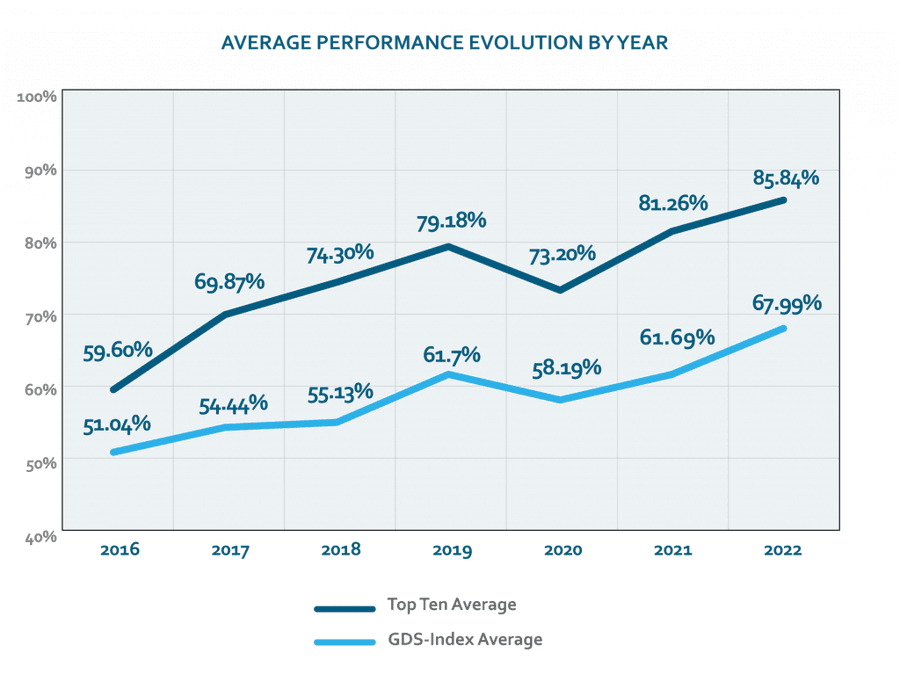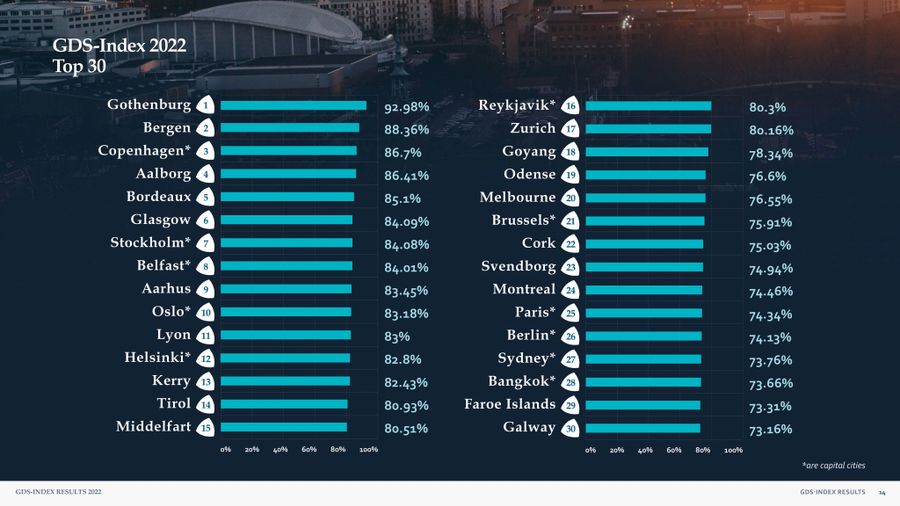The GDS-Index showcases brave, bold, and pioneering destinations that recognise the urgent need to collaborate towards the regeneration of our cities and towns through tourism and events, and actively work towards creating places where visitors, communities, and nature can flourish.
Here is an overview of the 2022 GDS-Index results from the world’s leading destination sustainability benchmarking and improvement programme, the Global Destinations Sustainability Index (GDS-Index).
The Big Picture
2022 shows one of the steepest growths in improvement across almost all metrics, raising the bar for destinations that will benchmark in 2023.
There has been a stunning 33% increase in average performance in seven years across all destinations and a 44% increase in the Top 10. This data proves that GDS-Index participants are raising the bar to become regional, national, and international leaders in the journey towards better destination management.
See the 2022 Top 30 destinations here.
The Return of the Nordics
In 2021, overall performance showed that Nordic countries participating in the GDS-Index leadership was waning as destinations from France, Ireland, Belgium, and Australia entered the Top 20. This year, however, the Nordics have made a huge performance comeback with 12 destinations in the Top 30, seven of which dominate the Top 10, including the first four spots.
The Rise of the Tiger Cities
Other surprises this year come from the Asia Pacific (APAC) destinations of the GDS-Index, where the usual top performers from Australia have been overtaken by their Korean and Thai neighbours, Goyang and Bangkok. Goyang joined in 2017, and after years of steady incremental improvements, Goyang’s performance jumped significantly this year, launching them into the Top 20 for the first time at 18th place, ahead of Melbourne (former APAC forerunner and supplier-strong destination in 2021, now in 20th place).
2022 GDS-Index Result Trends
From the 2022 results, six key trends were identified that are and will continue to shape the future of destination management, marketing, and stewardship.
1. Integrative Strategy
80% of GDS-Index destinations now have a sustainable tourism strategy, up from 47% in 2019.
2. Democratic Participation
Citizen and stakeholder engagement are also continuing to improve, with 45% of participating destinations collaborating with the public in all aspects of decision-making, including the development of ideas and solutions.
3. Equity, Diversity, and Inclusion
EDI (or DEI) is an increasingly important topic for organisations, so in 2022 the GDS-Index introduced a new DEI criterion, and results show that 29% of participating destinations do not have any DEI strategy, training, or tools in place.
4. Capacity Building
Cities, countries, and regions are stepping up their projects to build capacity and competence, and attract business based on their responsible tourism practice and reputation. An average of 34% of hotels across all destinations now have third-party certification, with a surprising increase in certified venue averages (from 47% to 58%), and an increase in the focus on destination circular economy (CE) with 63 % of destinations promoting CE initiatives to hotels, and 57% of destinations are promoting CE initiatives to restaurants.
4. Impact Measurement
In 2022, 48% of DMOs have a system to measure and monitor the environmental, economic, and social impact and performance of tourism, and 26% of DMOs have a system to measure and monitor the same impact of events, with 69% of participating destinations not monitoring the environmental impact of tourism and/or events.
5. Evolution of sustainability governance
92 % of DMOs have a dedicated sustainability manager. A trend to watch is the evolution of strategic sustainability management in destinations. Three stages have been identified: Start-up, Integrated, and Empowered.
Toward 2023
The GDS-Index data overall highlights that there are many reasons to be hopeful and positive about the future of travel and events. Destination management organisations around the world are stepping up, scaling up and speeding up the development and implementation of their sustainability strategies.
As Organisational Development mastermind, Frederic Laloux shares, “I sense a tipping point. Right now, leaders who have the courage to listen to their integrity and turn hard questions into inspiring quests are still outliers. Soon, the inverse will be true: those with the courage to lead from integrity will be viewed as the natural leaders of the day. And everywhere, talented and inspired people will gravitate to work with them”.
Guy Bigwood, Chief Changemaker and CEO, GDS-Movement urges us on together. “GDS-Movement salutes its members’ continuous commitment to measuring and managing the sustainability contributions of their tourism and events. Every step in the journey towards a destination’s social, environmental, and economic well-being counts dramatically and all GDS-Index participants are stewards of positive change. Given the reach of Business Events, it’s critical that this sector, specifically, further leverages the opportunity to act now, raise the bar, and invest in a thriving destination on a journey towards greater regenerative destination management, today and going forward. Working together, we all win.”
Download the full report here.
More
- See the 2022 GDS-Index results here.
- Get the official 2022 GDS-Index Results and Awards press release here.
- See who made the 2022 GDS-Index Top 30 list here.
- Compare destinations and filter by variables like size, location, and more. Try the advanced search here.





